A recent survey showed that 58% of adults in the United States feel a company’s reputation is a major factor in purchasing a product or service. Brands feel this on their end of things, too. In a survey conducted by Deloitte, roughly 90% of over 300 executives surveyed ranked brand reputation as the most significant risk area companies face.
In today’s digital age where consumers have instant access to information and platforms to express their opinions, building and maintaining brand reputation has become more important than ever. With review platforms, social media, and forums readily available, consumers can now share their opinions about a brand with a global audience. Positive reviews and recommendations can attract new customers, while negative comments scare away potential customers and harm your brand’s reputation.
When potential customers search for a brand, they often rely on the information they find online to make purchasing decisions. A brand with a positive reputation will naturally appear more reliable and trustworthy, thus increasing the likelihood of attracting and retaining customers.
By leveraging various strategies and techniques, you can safeguard your brand’s image, credibility, and trustworthiness among consumers. Brand reputation management not only helps build credibility and trust among consumers but also protects your brand from potential crises and negative publicity.
Here’s what you need to know about brand reputation management for 2024 and beyond.
What is brand reputation management?
Brand reputation management refers to a brand’s perception by consumers, stakeholders, and the public. It reflects the overall evaluation of a brand based on several factors like product quality, customer service, social responsibility, and brand messaging.
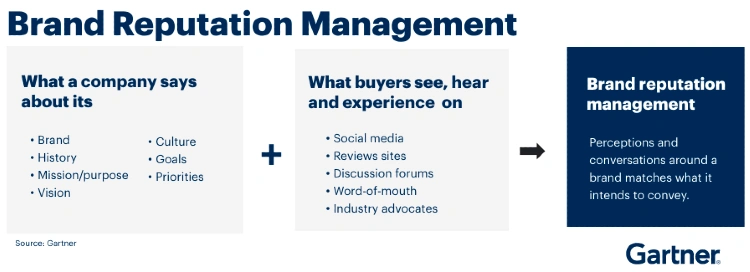
A positive brand reputation leads to consumer trust, loyalty, and purchase decisions. It can be measured through brand awareness, equity, and image. A strong brand reputation provides a competitive advantage, leading to increased customer loyalty and positive market positioning. On the other hand, a negative reputation can result in losing your customers’ trust and potentially a subsequent loss of sales.
Building and managing your brand reputation requires consistency, engaging with customers, and demonstrating transparency and accountability both internally and externally at your organization. Overall, brand reputation shapes a brand’s success, influencing customer perceptions, business performance, and long-term sustainability.
Measuring brand reputation
Measuring brand reputation is crucial for business success. It can help your company identify its strengths and weaknesses, make informed decisions, and build a positive image. By understanding brand reputation, companies can identify areas for improvement and assess how their brand is perceived by the target audience, stakeholders, and the general public.
Here are some of the common methods for measuring brand reputation:
Surveys
Surveys are a popular method for measuring brand reputation. They involve collecting feedback from customers or a target audience through a structured set of questions. Surveys can be conducted via online platforms, emails, phone calls, or in-person interviews. The questions can focus on various aspects, such as brand awareness, trust, satisfaction, perceived value, and overall brand reputation. Careful designing and analysis of surveys can provide valuable insights into brand perception.
Interviews
Interviews involve conducting one-on-one or group discussions with customers, stakeholders, or industry experts to understand their opinions and experiences with a brand. They may be structured or unstructured, according to the research objectives. This method enables in-depth exploration of brand reputation and allows for nuanced insights. Interviews can provide qualitative data and reveal context-specific information that surveys may not capture.
Social media monitoring
Monitoring social media platforms is essential for measuring brand reputation in the digital age. It involves analyzing social media conversations, posts, mentions, and comments related to a brand. Tools and analytics platforms can help track brand sentiment, customer feedback, and public discussions about the brand. Social media monitoring provides real-time data and enables brands to identify and manage potential reputation issues and engage with customers directly.
Media Coverage Analysis
Analyzing the types and extent of media coverage garnered by a brand across various publications and mediums can provide insights into brand reputation.
Repeat Purchase Rate
Businesses can gauge customer satisfaction and loyalty by determining the number of customers who make multiple purchases within a specific period and calculating the repeat purchase rate.
To track progress, companies most often establish key performance indicators (KPIs). Metrics like brand awareness, customer loyalty, and market share help assess brand reputation. Analyzing media coverage and online reviews also provides insights into public perception. Regular monitoring and analysis of these KPIs help identify trends, evaluate branding strategies, and maintain and enhance brand reputation in the market.
Transform Your Brand Narrative With Influencers!
Boost credibility, fortify trust.
Discover Afluencer: Your Reputation Upgrade Starts Here. Click Now!
START BOOSTING REPUTATION
Brand reputation management strategies to follow
Brand reputation management is essential for businesses in today’s competitive landscape. With the rise of social media platforms, a company’s reputation can be easily tarnished or enhanced within seconds. Therefore, having effective strategies in place is essential to protect and strengthen a brand’s reputation. To effectively manage brand reputation, businesses must actively monitor their online presence, prioritize transparency, and maintain strong customer relationships.
1. Monitor your online reputation regularly
Regularly monitor your brand’s online presence and respond to any negative comments or reviews. It helps you to stay informed about what people are saying, helps you address any negative comments or reviews promptly, maintains a positive image, and builds credibility with customers. Sometimes, you may find fake or inauthentic reviews that are harming your reputation. Platforms like Amazon have strict policies against fake reviews, which means that reporting them can give your product pages a boost in their visibility.
2. Respond promptly and professionally
Responding to complaints promptly is crucial to maintaining your brand’s reputation. Acknowledging the issue and offering a solution or a way to rectify the situation ensures customer satisfaction, builds brand credibility, and generates positive word-of-mouth while mitigating potential damage on social media platforms.
3. Create quality content
Blog posts, videos, and social media updates are all avenues to create quality content that can improve your brand’s reputation by showcasing expertise, credibility, and value to the audience. It helps build trust and loyalty among your customers, attract new ones, and help you gain recognition as a reputable and authoritative source in the industry.
4. Engage with your audience
Engaging with your audience can foster a sense of connection and build a loyal community, thus improving your brand’s reputation. Be prompt to respond to comments and messages from your audience and engage with them – it’s a way to show that you value their opinions. Moreover, engaging with your audience creates a positive perception of your brand and enhances trust and credibility.
5. Work with influencers
The power of reviews in influencer marketing cannot be emphasized enough. Collaborations with influencers can be an effective strategy to reach a wider audience base and improve your brand’s reputation. With the growth of AI, the influencer marketing landscape for brands is quickly changing. With access to data-driven insights, the influencer-selection process can be automated enhancing campaign performance and ensuring authenticity and relevance -in influencer partnerships.
6. Have a crisis management plan in place
Have a plan in place to address any negative situations that may arise. It allows your company to respond quickly and effectively to unforeseen events, and address the crisis promptly and transparently, while minimizing damage, regaining trust, and maintaining a positive public image.
7. Be transparent and honest
To build trust and credibility with your audience, it’s integral to willingly and openly share information. It shows that you value integrity and can lead to heightened customer loyalty, positive word-of-mouth, and a strong brand reputation. If you make a mistake, be sure to own up to it and offer a solution.
8. Provide excellent customer service
High-quality customer service can not only help you retain customers but also attract new ones by ensuring customer satisfaction and loyalty. Positive experiences lead to repeat business and word-of-mouth recommendations, contributing to a good brand image. On the other hand, poor customer service can quickly damage your brand’s reputation and deter potential customers.
Online reputation management tools
Online reputation management (ORM) tools allow individuals, businesses, and brands to monitor, analyze, and improve their online presence to promote positive content and mitigate negative reviews or comments. With so many different tools available, it can be difficult to know which ones are worth investing in. To help you choose, we’ve compiled a list of the top online reputation management tools.
Google Alerts
A free tool that lets you monitor the web for mentions of your brand, name, or competitors, Google Alerts lets you set up alerts for keywords and receive email notifications when new content is published. This is a great way to stay up-to-date on your online presence and respond to negative comments quickly.
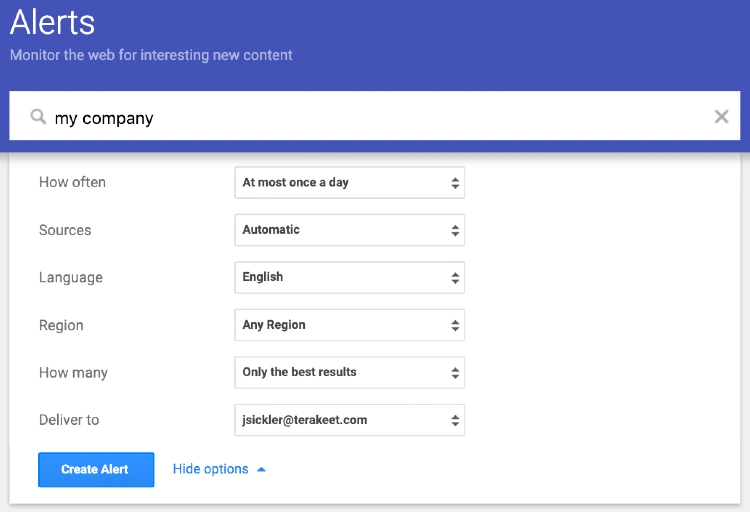
For instance, Coca-Cola and PepsiCo use Google Alerts to monitor their brand reputation and track any emerging trends in the beverage industry. Southwest Airlines uses the tool to stay up-to-date on potential flight disruptions or any negative comments about their service.
BrandYourself
BrandYourself is a comprehensive online reputation management platform that helps you improve your online reputation and control what people see when they search for you. With BrandYourself, you can monitor your online reputation, track social media mentions, and improve your search engine results.
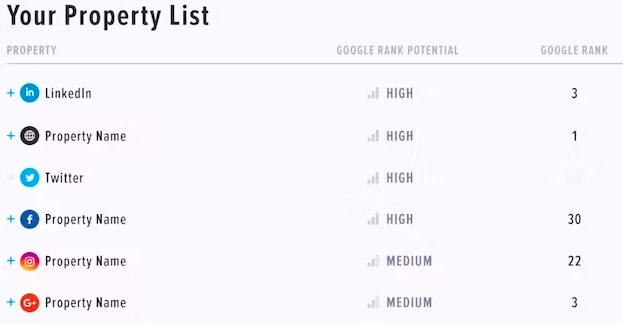
Along with scanning the Google search results of their clients, BrandYourself also uses CleanPost and CleanImage Technology to scan for potentially damaging or polarizing content on client profiles. This makes their reputation management services extremely effective.
ReviewTrackers
ReviewTrackers is a review management and reputation monitoring tool that assists businesses in tracking, analyzing, and responding to customer feedback across multiple review platforms. It gives businesses the ability to aggregate reviews from sites like Yelp, Google, and TripAdvisor, and respond to them all from one central dashboard.
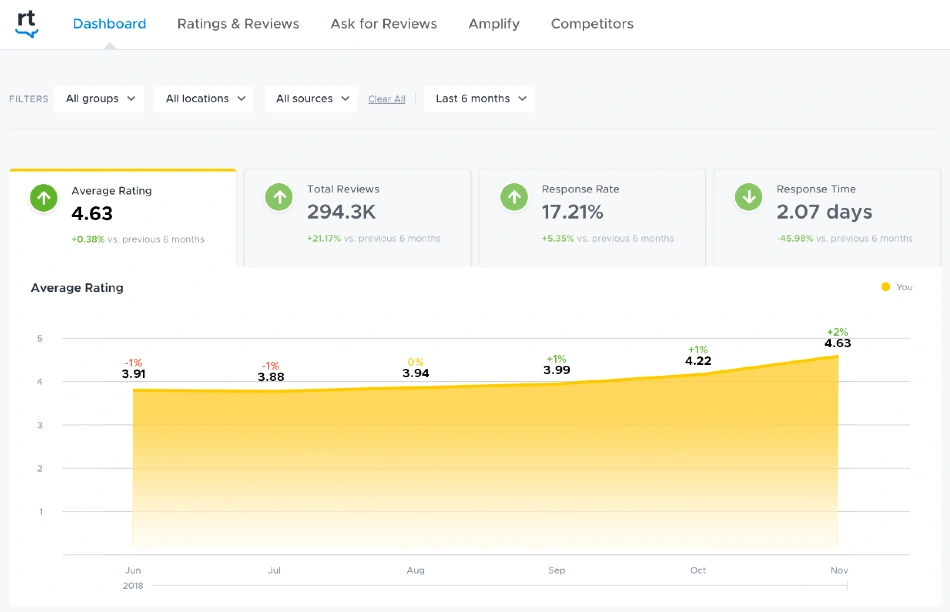
When you use ReviewTrackers, your business gets an alert whenever a new review is posted, so you can respond quickly and efficiently.
Hootsuite Insights
Hootsuite Insights is a social listening tool that helps businesses monitor social media channels for mentions of their brand, competitors, or industry trends. With Hootsuite Insights, you can identify and respond to negative comments or reviews quickly and also gather insights about your overall social media performance.
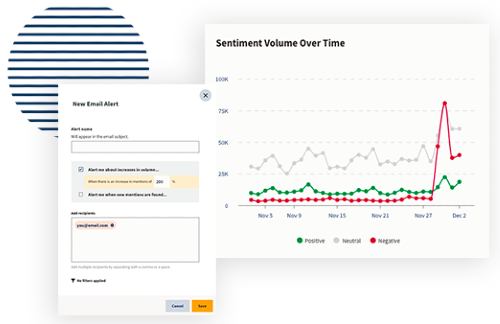
In case of a crisis or negative publicity, Hootsuite Insights enables you to stay on top of the situation. By monitoring conversations and sentiments, you can identify issues early and respond promptly to address customer concerns or mitigate any damage to your brand reputation.
Reputology
Reputology is a review management platform that focuses on helping businesses manage their online reviews from one place. With Reputology, businesses can monitor reviews on multiple platforms, respond to feedback, and gather customer insights.
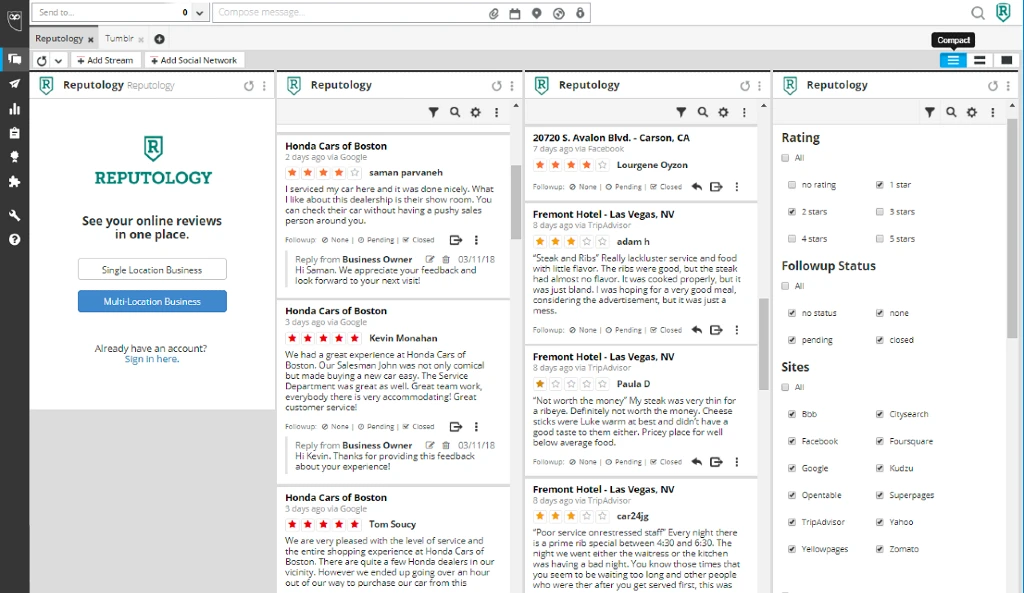
Did you know, over 80% of consumers expect a response within 24 hours of their post? Using Reputology, you can get automated email notifications to stay on top of new reviews and reply directly from the tool’s interface.
Megan L, Marketing, FRSG (FSR Magazine) says “Reputology acts as a gauge on how we are doing, letting us know whether or not employees are doing their job well. It helps point out key areas where we are—-or aren’t—doing well, based on customer responses”.
Yext
Yext is a tool that enables businesses to manage their online presence across several directories and review platforms. With Yext, businesses can update their information (like hours, locations, and contact information) on all platforms from one central location.
Yext helps businesses keep their online information accurate and up-to-date in hundreds of directories and online platforms, which is an essential element of reputation management. The tool can also help your business engage with customers, address their concerns and issues quickly, and build a positive brand reputation.
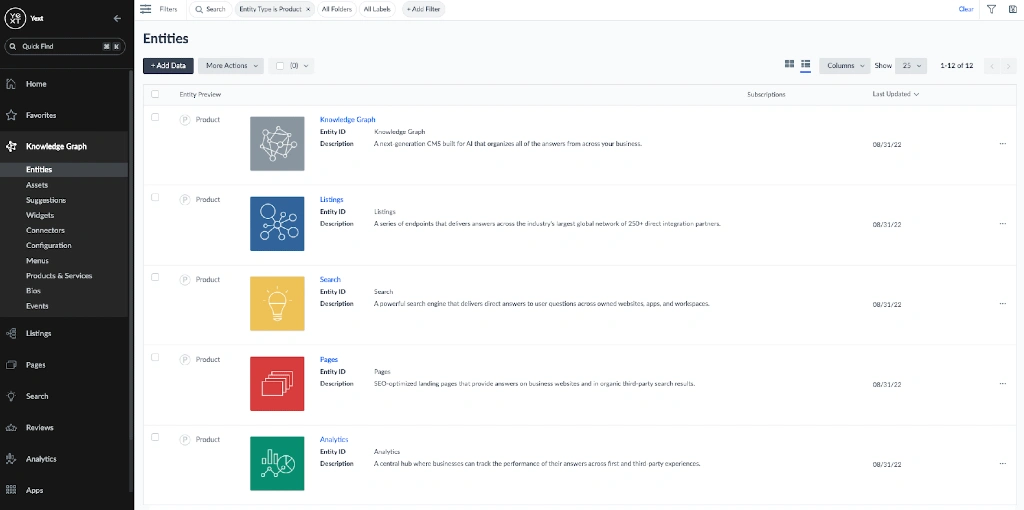
SEMrush
SEMrush is primarily a search engine optimization (SEO) tool, but it also offers features for online reputation management. With SEMrush, businesses can monitor brand mentions, track online reviews, and analyze their search engine results pages (SERPs) to see where they rank compared to competitors.
Esther Gimenez, Senior SEO & UX Consultant, Annalect, says “What I appreciate most about Semrush is that it covers all areas of search with its tools so I can have a 360-degree view of my projects.”
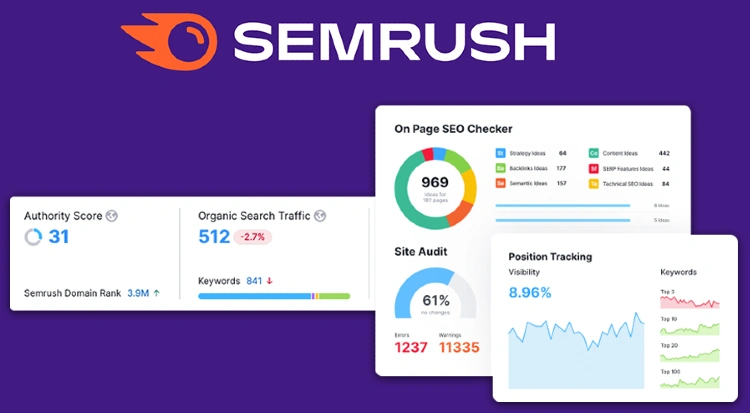
Mention
A social media and web monitoring tool, Mention, as the name suggests, allows businesses to track mentions of their brand, competitors, and trends across different platforms. This includes social media, blogs, forums, and news sites. With Mention, businesses can respond to negative comments and reviews quickly, as well as identify influencers who might be able to help promote their brand.
Another useful feature: businesses can track mentions of their competitors’ brand names. This information can be used to identify areas where the brand can differentiate itself and improve its competitive position.
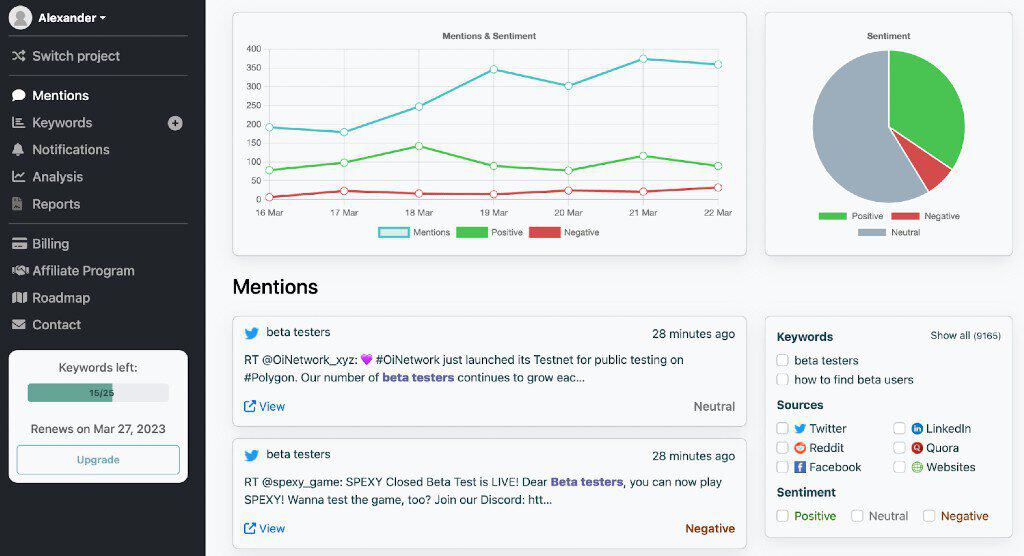
Chatmeter
Chatmeter is an AI-powered platform specifically designed for multi-location businesses. It allows businesses to manage and monitor their online reviews and reputation across multiple locations and review platforms. Chatmeter’s website states “Our fully-integrated solutions make it easy for you to elevate your customer experience and reputation at scale.”
Hundreds of multi-location brands worldwide use Chatmeter; these include Brookshire Brothers, Rise Brands, BrightView, and more.
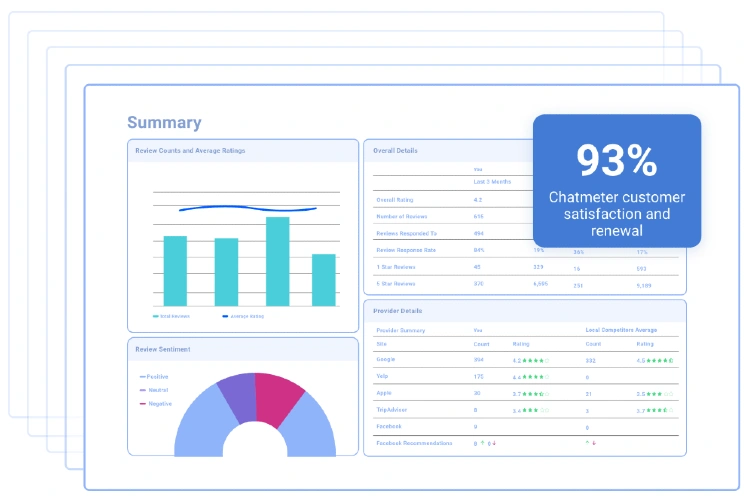
BirdEye
BirdEye is a comprehensive online reputation management platform that includes features for review management, listing management, social media monitoring, and customer surveys. It allows businesses to listen to customer feedback, engage with customers, and improve their online reputation.
With so many online reputation management tools available, businesses and individuals have no excuse not to be actively managing their online presence. By investing in these tools, you can ensure that your online reputation remains positive and your business continues to grow.
Aaron Novello, Team Leader of The Novello Group, says “Birdeye gives our company instant credibility and makes getting reviews easier. We’ve seen an increase in customers contacting us directly from online, which gets our foot in the door. Birdeye also helps us build trust with customers, which is invaluable.”

Building an authentic brand reputation
Building an authentic brand reputation is crucial for the long-term success of any business. Customers today are highly discerning and are more likely to engage with brands that have a transparent reputation with a commitment to quality, ethical practices, and good customer service.
“Your brand’s reputation matters a lot. 87% of buyers take reputation into account when purchasing a product or service. Building a reputation starts with trust.” – Kate Bourgoin, The Customer Whisperer
The first management step to building an authentic brand reputation is to define your brand values. Brand values are what you stand for as a business. They are the guiding principles that shape the actions and decisions of your company. Determine your mission, vision, and core values, and ensure they align with your business goals and resonate with your target audience.
To build an authentic brand reputation, you need to know your target audience and ensure your product and service quality speaks for your brand. Does your audience value sustainability? Are they looking to engage with brands that are environmentally and socially responsible? Understanding your audience’s needs, values, and preferences helps you to create content that resonates with them and builds a connection.
Consistency is key
So focus on keeping your branding consistent across all online and offline channels – from your website to social pages. Your tone of voice, imagery, typography, and overall brand aesthetic should all be consistent. A consistent brand helps build trust and recognition.
Engaging with your audience is another crucial element of building an authentic brand reputation. Respond to comments and questions, and make sure you are transparent in your communication. Address customer concerns, and take criticism constructively.
Finally, measuring and tweaking your brand efforts is essential to understand whether you are meeting your objectives. Tweak your approach where necessary to maintain brand relevance and authenticity.
Building an authentic brand reputation is a long-term undertaking, but it is worthwhile. Remember that your brand’s destiny is in your hands. Platforms like Afluencer can help you partner with relevant influencers to help you along in your journey to improved brand reputation. Install the Afluencer app for Shopify here.
Frequently Asked Questions: Brand Reputation Management
Which businesses need to manage their online reputation?
Any business present on the internet needs to manage its online reputation. But certain domains demand a stronger presence than others. For example, ecommerce and service industries like hotels, entertainment, and healthcare need it more.
You can begin by googling your company’s name and adding “reviews” at the end of the search. Or your online reputation management software can help you figure this out.
How can I learn what customers are saying online about my brand?
You can begin by googling your company’s name and adding “reviews” at the end of the search. Or your online reputation management software can help you figure this out.
How does reputation affect a company’s profits?
Up to 82% of American customers check reviews online before purchasing a product. If your reviews are mostly negative, it will affect the sales and thus your profit margins.